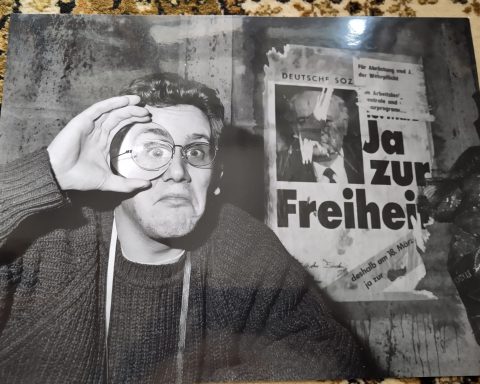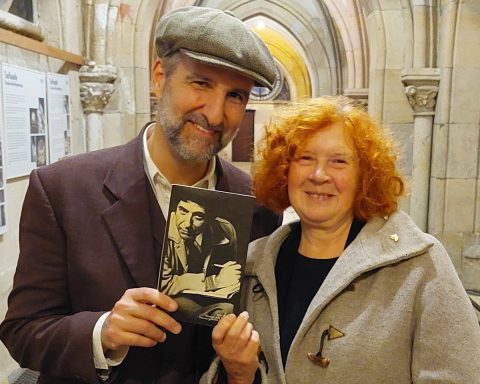
Editor’s note: The idea for this column, which debuted last Saturday, is for people to share their transnational cultural experiences – a past and present involving personal relationships where our sense of belonging, country and background intersect with another, or multiple others, in deeply personal ways that imprint feelings and memories and shape us and change us in some important way. If you’d like to share your own story with us as a guest columnist, please write us at newswriterana@gmail.com.
Part II of #GoingGlocal’s “Thank you for your letter,” a five-part series written by German novelist and Leipzig Writer member Diana Feuerbach, depicts the beginning of the accidental pen-pal relationship between Diana growing up in the GDR and a girl growing up in the Soviet Union – the pivot of the whole story. The series will continue to run every Saturday for the next four weeks.
“Thank you for your letter,” Part II: A Cardigan for Lake Baikal
By Diana Feuerbach
Then, one day, I got a letter. Only the city and street address where I lived were written on the envelope. The sender from the Soviet Union had gone through a magazine listing addresses of East-German children looking for penpals. She’d picked an address in Karl-Marx-Stadt, maybe because she’d heard of the town in a song that was popular back then with Russians. She figured the person advertising in the magazine would be getting lots of mail already, leaving her without a reply, so she changed the house number and omitted the name.
I don’t know which Saxon mailwoman was on duty on day X, delivering letters and postcards to my row of plattenbau tenements on a sloping hillside. Was she a young woman or an older one? Chubby or slender? And how was the weather that day? Did the mailwoman come plodding through heavy snows or was she sweating in the sun? I imagine her there, standing in my block’s entrance, in front of the mailboxes, with the mysterious envelope in hand. She studies the elegant handwriting and the stamps showing hammer, sickle, a red star, and the imprint CCCP. She wonders which slot to drop the letter into.
Which of the twelve families living here has a child of suitable age? She can’t quite seem to remember. Maybe she’s only a substitute from a different district, and completely clueless. Maybe she’s simply annoyed by anonymous letters. A mailwoman supposed to play a kind of Russian mail roulette? A reluctant Lady Luck.
“You got a letter,” my parents would have said—as usual when I received a piece of mail. I regret not remembering that significant moment. Nor do I recall the contents of that very first contact. Only the fact that someone had written to me in Russian stuck with me, an entire page filled with Cyrillic script. Damn amazing. I guess the girl from Leningrad simply introduced herself. Her name: Evgenia, shortened to Genia with a very soft G. Her age: one year younger than me. Her accommodation: a bedroom community just like mine, where she shared a flat with her parents and a younger brother, just like me. Her hobby: gymnastics.
Genia from Leningrad—a city that had been occupied by the Germans for two and a half years during the war. Genia didn’t mention that atrocity; it happened before our time and now we were supposed to become friends. I sat down to write a reply. With the help of my dictionary, I labored to compose a few statements in Russian, realizing that my school lessons were useless for conveying intelligible ideas or messages. Given these limitations, I couldn’t tell you what news or even emotions Genia and I shared in our first years of correspondence. But I could swear that every letter started out with the beautifully curved Cyrillic D for Doragaya Genia/Doragaya Diana (Dear Genia/Dear Diana), followed by the standard opening line: “Thank you for your letter.”
Before long, a second penpal entered the scene. Larissa from Irkutsk; a city in Siberia on the Lake Baikal, the deepest freshwater lake on Earth. Simply magical. Sadly, our friendship didn’t last long… although Larissa gave me something I still keep in a trunk full of old toys and children’ books. Her gift to me was a doll with a pasty-white face, clad in a green bonnet and a minidress. A Russian ”Little Green Riding Hood.“ A wispy creature. I didn’t get very excited, preferring dolls of much darker complexion called Negerpuppen (negro dolls) without the slightest hint of disrespect. Larissa didn’t know that, of course. She seemed to have a talent for business. As a return present for the kukla (doll), she asked me for a kofta. Puzzled by her request, my mother pored over the Russian dictionary. Did the girl really want a jacket from us? Was she freezing in the Siberian winter? Was she crying with her mom in front of empty hangers in the department store of Irkutsk?
That much was certain: in Karl-Marx-Stadt too, quality children’s clothes were a scarce commodity. Like just about everything but bread and cabbage, they were a lucky find. The only way to get your hands on them was by following your intuition, patiently waiting in the right line at the right hour on the right day. Still, we hated to disappoint Larissa. So eventually, my mother organized (whether brand new from Centrum Warenhaus or handed down from our West-German cousins, she doesn’t recall) a fairly nice cardigan for my Russian penpal. We mailed it off… and never again heard a word from Irkutsk.
To this day we speculate about what might have happened. Did a Siberian mailwoman steal the package? Was the cardigan the wrong size? Didn’t Larissa like it? Had she, desperate for something to wear, only feigned her friendship with me? Did she fill her wardrobe courtesy of penpals all over the world? Is the cardigan, thirty years on and many wearers later, now lying on the bottom of Lake Baikal, its stitches a home for copepods?
We have no idea.
(To be continued in Part III, next Saturday…)








![Wine & Paint event on 9 Nov. 2024 at Felix Restaurant, Leipzig. Photo: Florian Reime (@reime.visuals] / Wine & Paint Leipzig](https://leipglo.com/wp-content/uploads/2024/12/pixelcut-export-e1733056018933-480x384.jpeg)

